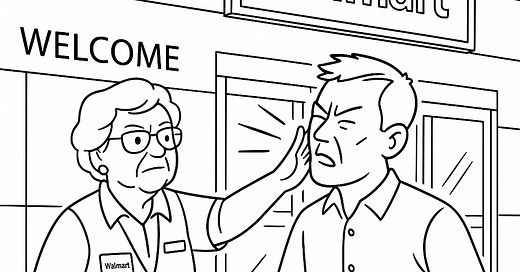No one visits Walmart for the ambience.
Walmart is a place people go for one reason: value.
Yes, no one visits Walmart for the ambience, the lighting, or the gentle waft of sadness near the frozen fish aisle. We go because it’s cheap, convenient, and (if we’re lucky) we only get run over by one mobility scooter.
That’s the unspoken agreement: we tolerate the weirdness, the chaos, and the guy in aisle five comparing soup cans while shirtless, because they have almost everything and we save money.
Now imagine if every time you walked into Walmart, you got slapped.
Not metaphorically… an actual, open-palm slap across the face from a cheerful greeter named Doris who says, “Welcome to Walmart—WHAP!”
At first, you’d be confused. Then annoyed. Then you’d take your business somewhere else. Because even if the prices are good, getting smacked every time you walk through the doors makes the savings feel… less worth it.
This is what it’s like when America slaps tariffs on its global trading partners.
See, the U.S. doesn’t just trade with its neighbours. It trades with everyone—Europe, Asia, Latin America, Africa. Tariffs, in theory, are supposed to protect domestic industries by making foreign goods more expensive.
It’s like putting a toll booth in front of imported stuff.
But the reality is that those foreign goods don’t vanish—they just cost more.
For everyone.
Including American consumers.
It’s like if Walmart raised the price of bananas because they were mad at Ecuador, then said to Americans, “Don’t worry, it’s for your own good.”
Thanks, Doris, but I just wanted fruit, not a lecture on supply chain nationalism.
And here’s where things start to unravel: global trade is built on trust.
Not warm, fuzzy trust like in a Disney movie, but reliable, no-surprises kind of trust. You make a deal, you deliver the goods, and everybody profits. But when America starts slapping tariffs around like it’s on a diplomatic reality show, it sends a message: “We might turn on you at any time.”
Canada notices.
Other countries notice.
They remember.
And they start shopping around.
Just like customers would find another store if Walmart kept slapping them, global trading partners start looking for alternatives. They ink deals with the EU. They boost trade with China. They explore regional partnerships where they’re not being treated like naughty schoolchildren who dared to sell steel at a competitive price.
Meanwhile, the U.S.—the world’s biggest economic Walmart—starts looking less like a great deal and more like a risk. A big, moody, unpredictable risk that might explode over dairy tariffs or a Twitter post.
Yes, tariffs can help certain American industries in the short term. But long term? They isolate the U.S. They shrink its influence. They create a trade environment where cooperation turns into competition, and mutual benefit becomes mutually assured inconvenience.
Let’s not forget that many U.S. industries rely on foreign inputs.
The automotive industry is a great example.
Tariff a component from one country, and suddenly the cost of making your American product jumps. It’s like building a Lego set where half the pieces now cost triple because they’re “foreign bricks.”
Eventually, you stop building. Or your customers stop buying. Either way, you’re left with an unfinished The Lord of the Rings: Barad-dûr (I had to look that up, you LEGO weirdos) and a vague sense of patriotism that doesn’t pay the rent.
There’s also the human element.
In a global economy, companies don’t just buy products, they build relationships. They invest in supply chains that stretch across continents. When tariffs show up, it’s not just about cost. It’s about disruption. It’s about uncertainty.
Businesses, despite their best efforts to look edgy in TV commercials, are deeply allergic to uncertainty.
Countries around the world have been patient. Polite. Even forgiving. But patience wears thin. Because no one wants to get slapped every time they show up with a shipment of wine, textiles, or car parts. They want partnership. Predictability. Maybe even a little respect.
America still has immense power. It still has innovation, culture, and a massive market everyone wants to access. But you can’t coast on charm forever.
Eventually, if you treat your partners like enemies, they start acting like it.
Not out of spite, out of self-preservation.
The global economy isn’t a battle royale, it’s more like a complicated group project. Everyone contributes. Everyone benefits. And yes, sometimes someone forgets to do their part, or shows up late with weird demands. But the solution isn’t to throw your chair across the room and demand everyone write your name at the top of the report. It’s to collaborate. Adapt. And, ideally, stop slapping people.
Because here’s the truth: being the world’s Walmart comes with responsibility.
People go there because it’s useful, affordable, and accessible.
But if it becomes a hostile place, they’ll leave.
Not because they hate you, but because value includes how you’re treated. And no one likes getting smacked just for showing up.
So maybe, just maybe, it’s time for America to rollback the economic slap and pick up something more effective.
Like a handshake.
Or better yet, a loyalty program.
###




I kinda want to print this out and post it on the break room bulletin board so all my MAGA coworkers can read it. It’s getting harder every day trying to do my job & tuning out the trumpy worshipers! Stay strong Canada! ✌️❤️😃🇨🇦(upside down 🇺🇸)
Just read your latest post re Walmart Tariffs and finally subscribed - keep up the good work - thank you : )